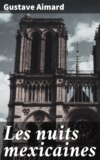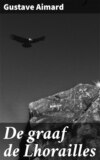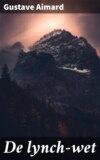Kitabı oku: «The Trappers of Arkansas: or, The Loyal Heart», sayfa 15
CHAPTER V.
THE ALLIANCE
We must now return to Loyal Heart.
After walking straight forward about ten minutes, without giving himself the trouble to follow one of those innumerable paths that intersect the prairie in all directions, the hunter stopped, put the butt end of his gun to the ground, looked round carefully on all sides, lent his ear to those thousands of noises of the desert which all have a meaning for the man accustomed to a prairie life; and, probably satisfied with the result of his observations, he imitated, at three different equal intervals the cry of the pie, with such perfection, that several of those birds, concealed among the thickest of the trees, replied to him immediately.
The third cry had scarcely ceased to vibrate in the air, ere the forest, mute till that moment, and apparently plunged in complete solitude, became animated as if by enchantment.
On all sides arose, from the midst of bushes and grass, in which they had been concealed, a crowd of hunters with energetic countenances and picturesque costumes, who formed, in an instant, a dense crowd round the trapper.
It chanced that the two first faces that caught the eye of Loyal Heart were those of Black Elk and Nô Eusebio, both posted at a few paces from him.
"Oh!" he said, holding out his hand eagerly; "I understand it all, my friends. Thanks! a thousand thanks for your cordial coming; but, praise be to God! your succour is not necessary."
"So much the better!" said Black Elk.
"But how did you get out of the hands of those devilish redskins?" the old servant asked, eagerly.
"Don't speak ill of the Comanches," Loyal Heart replied, with a smile; "they are now my brothers."
"Do you speak seriously?" cried Black Elk, with warmth; "can you really be on good terms with the Indians?"
"You shall judge for yourself. Peace is made between them and me, my friends. If agreeable to you, I will introduce you to each other."
"By Heaven! at the present moment nothing could fall out more fortunately," said Black Elk; "and as you are free, we shall be able to concern ourselves for other people, who are, at this moment, in great peril, and stand in need of our immediate assistance."
"What do you mean?" Loyal Heart asked, with a curiosity mingled with interest.
"I mean, that some people to whom you have already rendered great services, on the occasion of the last fire in the prairie, are at this moment surrounded by a band of pirates, who will soon attack them, if they have not already done so.
"We must fly to their assistance!" cried Loyal Heart, with an emotion he could not control.
"Well, that was our intention; but we wished to deliver you first, Loyal Heart. You are the soul of our association; without you we should have done no good."
"Thanks! my friends. But now, you see, I am free, so there is nothing to stop us; let us set forward immediately."
"I crave your pardon," Black Elk replied; "but we have to deal with a strong body. The pirates, who know they have no pity to look for, fight like so many tigers. The more numerous we are, the better will be our chance of success."
"That is true; but what do you aim at?"
"At this – since you have made, in our name, peace with the Indians, it could be so managed that they – "
"By Heavens! you are right, Black Elk," Loyal Heart interrupted him, eagerly. "I did not think of that. The Indian warriors will be delighted at the opportunity we shall offer them of showing their valour. They will joyfully assist us in our expedition. I take upon myself to persuade them. Follow me, all of you. I will present you to my new friends."
The trappers drew together, and formed a compact band of forty men.
Arms were reversed, in sign of peace, and all, following the steps of the hunter, directed their course towards the camp of the Comanches.
"And my mother?" Loyal Heart asked Eusebio, with a broken voice.
"She is in safety in the hatto of Black Elk."
"And how is she?"
"As well as you could expect, though suffering from great uneasiness," the old man replied. "Your mother is a woman who only lives by the heart. She is endowed with immense courage, the greatest physical pains glide over her. She now feels but slightly the effects of the atrocious tortures she had begun to undergo."
"God be praised! But she must no longer be left in these mortal doubts; where is your horse?"
"Hidden, close by."
"Mount, and return to my mother. Assure her of my safety, and then both of you retire to the grotto of Verdigris, where she will be out of all danger. You will remain with her. That grotto is easily found; it is situated at a small distance from the rock of the Dead Buffalo. When you get there, you have nothing to do but to let loose my rastreros, which I will leave you, and they will lead you straight to it. Do you clearly understand me?"
"Perfectly."
"Begone then. Here we are at the camp; your presence is useless here, whilst yonder it is indispensable."
"I am gone!"
"Adieu! we'll meet again."
Nô Eusebio whistled the bloodhounds, which he leashed together; he then, after another shake of the hand with his young master, left the troop, turned to the right, and resumed the way to the forest. The hunters, in the meantime, arrived at the entrance of the glade in which the camp of the Indians was established.
The Comanches formed, a few paces behind the first lines of their camp, a vast semicircle, in the centre of which stood their chiefs.
To do honour to their newly-arrived friends, they had put on their handsomest costumes. They were painted and armed for war.
Loyal Heart halted his troop, and continuing to march on alone, he unfolded a buffalo robe, which he waved before him.
Eagle Head then quitted the other chiefs, and advanced on his part to meet the hunter, also waving a buffalo robe in sign of peace.
When the two men were within three paces of each other they stopped. Loyal Heart spoke the first.
"The Master of Life," he said, "sees into our hearts. He knows that among us the road is good and open, and that the words which our lungs breathe and our mouths pronounce are sincere. The white hunters come to visit their red friends."
"They are welcome!" Eagle Head replied cordially, bowing with the grace and majestic nobleness which characterize Indians.
After these words the Comanches and the hunters discharged their pieces into the air, amidst long and loud cries of joy. Then all ceremony was banished; the two bands mingled, and were confounded so thoroughly that, at the end of a few minutes, they only formed one.
Loyal Heart, however, who knew from what Black Elk had told him how precious the moments were, took Eagle Head aside, and explained to him frankly what he expected from his tribe.
The chief smiled at this request.
"My brother shall be satisfied," he said, "let him but wait a little."
Leaving the hunter, he joined the other chiefs. The crier quickly mounted upon the roof of a hut, and convoked with loud cries the most renowned warriors to a meeting in the hut of council.
The demand of Loyal Heart met with general approbation. Ninety chosen warriors, commanded by Eagle Head, were selected to accompany the hunters, and co-operate with all their power to secure the success of the expedition.
When the decision of the chiefs was made known, it created a general joy throughout the tribe.
The allies were to set forward at sunset, in order to surprise the enemy.
The great war-dance, with all the ceremonies usual upon such occasions, was danced, the warriors the while continually repeating in chorus: —
"Master of Life, look upon me with a favourable eye, thou hast given me the courage to open my veins."
When they were on the point of setting out, Eagle Head, who knew what dangerous enemies they were going to attack, selected twenty warriors upon whom he could depend, and sent them forward as scouts, after having given them some scotte wigwas, or bark wood, in order that they might immediately light a fire as a warning in case of alarm.
He then examined the arms of his warriors, and, satisfied with the inspection, he gave the orders for departure.
The Comanches and the trappers took the Indian file, and, preceded by their respective chiefs, they quitted the camp, amidst the good wishes and exhortations of their friends, who accompanied them to the first trees of the forest.
The little army consisted of a hundred and thirty resolute men, perfectly armed, and commanded by chiefs whom no obstacle could stop, no peril could make recede.
The darkness was dense; the moon, veiled by large black clouds, which floated heavily in space, only shed at intervals a dull, rayless light, which, when it disappeared, gave objects a fantastic appearance.
The wind blew in gusts, and filled the ravines with dull, plaintive moans.
In short, this night was one of those which in the history of humanity seemed destined to witness the accomplishment of dismal tragedies.
The warriors marched in silence; they looked in the darkness like a crowd of phantoms escaped from a sepulchre, hastening to accomplish a work without a name, accursed of God, which night alone could veil with its shadow.
At midnight the word "halt" was pronounced in a low voice.
They encamped to await news of the scouts.
That is to say, everyone, whether well or ill placed, laid himself down exactly where he happened to be, in order to be ready at the first signal.
No fire was lighted.
The Indians, who depend upon their scouts, never post sentinels when they are upon the warpath.
Two hours passed away.
The camp of the Mexicans was not more than three miles distant at most; but, before venturing nearer, the chief wished to ascertain whether the route were free or not; in case it should not be so, what were the numbers of the enemy who barred the passage, and what plan of attack they had adopted.
At the moment when Loyal Heart, a prey to impatience, was preparing to go himself to ascertain what was going on, a rustling, almost imperceptible at first, but which by degrees increased in enormous proportions, was heard in the bushes, and two men appeared.
The first was one of the Comanche scouts, the other was the doctor.
The state of the poor savant was truly pitiable.
He had lost his wig; his clothes were in rags; his face was convulsed with terror; in short, his whole person bore evident traces of struggle and combat.
When he was brought before Loyal Heart and Eagle Head, he fell head-foremost to the ground and fainted.
Earnest endeavours were immediately made to restore him to life.
CHAPTER VI.
THE LAST ASSAULT
The lanceros posted behind the entrenchments had received the pirates warmly.
The general, exasperated by the death of Captain Aguilar, and perceiving that with such enemies there was no quarter to be expected, had resolved to resist to the last, and to kill himself rather than fall into their hands.
The Mexicans, reckoning the peons and guides, in whom they scarcely dared to trust, amounted to only seventeen, men and women included.
The pirates were at least thirty.
The numerical disproportion was then great between the besiegers and the besieged; but thanks to the strong position of the camp, situated on the summit of a chaos of rocks, this disproportion partly disappeared, and the forces were nearly equal.
Captain Waktehno had not for an instant deceived himself with regard to the difficulties of the attack he meditated – difficulties almost insurmountable in an open assault; therefore he had depended upon a surprise, and more particularly upon the treachery of the Babbler. It was only from having been carried away by circumstances, and being furious at the loss Captain Aguilar had caused him, that he had ventured upon an assault.
But the first moment of effervescence over, when he saw his men falling around him like ripe fruit, unrevenged, and without gaining an inch of ground, he resolved not to retreat, but to change the siege into a blockade, hoping to be more fortunate during the night by some bold coup de main, or, in the end, certain of reducing the besieged sooner or later by famine.
He believed himself certain that they would find it impossible to obtain succour in the prairies, where there were none but Indians, hostile to the whites, whoever they might be, or trappers and hunters, who cared very little to intermeddle in affairs that did not at all concern them.
His resolution once taken, the captain put it in execution immediately.
He cast an anxious look around him; his situation was still the same; notwithstanding their almost superhuman efforts to climb the abrupt ascent which led to the entrenchments, the pirates had not gained a single step. The moment a man showed himself openly, a ball from a Mexican carbine sent him rolling down the precipice.
The captain gave the signal for retreat; that is to say, he imitated the cry of the prairie dogs.
The combat ceased instantly.
The spot, which an instant before was animated by the cries of combatants and the continued report of firearms, sank suddenly into the completest silence.
Only, as soon as the men had paused in their work of destruction, the condors, the vultures, and urubus commenced theirs.
After pirates, birds of prey! that is according to the order of things.
Swarms of condors, vultures, and urubus came hovering over the dead bodies, upon which they fell uttering sharp cries, and made a horrible carnage of human flesh, in sight of the Mexicans, who did not dare to leave their entrenchments, and were forced to remain spectators of this hideous banquet of the wild creatures.
The pirates rallied in a ravine, out of reach of the fire, and counted their numbers.
Their losses were enormous; out of forty, nineteen only remained.
In less than an hour they had had twenty-one killed, more than half of their whole band.
The Mexicans, with the exception of Captain Aguilar, had neither killed nor wounded.
The loss the pirates had sustained made them reflect seriously upon the affair.
The greater number were of opinion it would be best to retire, and give up an expedition which presented so many dangers and so few hopes of success.
The captain was even more discouraged than his companions.
Certes, if it had only been to gain gold or diamonds, he would, without hesitation, have resigned his projects; but a feeling more strong than the desire of wealth influenced his actions, and excited him to carry the adventure through, whatever might be the consequences to him.
The treasure he coveted – a treasure of incalculable price – was Doña Luz, the girl whom he had, in Mexico, rescued from the hands of his own bandits, and for whom he entertained a violent, boundless, characteristic passion.
From Mexico he had followed her step by step, watching, like a wild beast, for an opportunity of carrying off his prey, for the possession of which no sacrifice was too great, no difficulty insuperable, and no danger worthy of consideration.
Therefore did he bring into play upon his bandits all the resources that speech gives to a man influenced by passion, to keep them with him, to raise their courage, and to induce them to attempt one more attack before retiring and definitely renouncing the expedition.
He had much trouble in persuading them; as generally happens in such cases, the bravest had been killed, and the survivors did not feel themselves at all inclined to expose themselves to a similar fate. By dint, however, of persuasions and menaces, the captain succeeded in getting from the bandits the promise of remaining till the next day, and of attempting a decisive blow during the night.
This being agreed upon between the pirates and their chief, Waktehno ordered his men to conceal themselves as well as they could, but, above all, not to stir without his orders, whatever they might see the Mexicans do.
The captain hoped, by remaining invisible, to persuade the besieged that, discouraged by the enormous difficulties they had met with, the pirates had resolved to retreat, and had, in fact, done so.
This plan was not at all unskilful, and it, in fact, produced almost all the results which its author expected.
The glowing fires of the setting sun gilded with their last rays the summits of the rocks and the trees; the evening breeze, which was rising, refreshed the air; the great luminary was about to disappear on the horizon, in a bed of purple vapours.
Silence was only disturbed by the deafening cries of the birds of prey, that continued their cannibal banquet, quarrelling with ferocious inveteracy over the fragments of flesh which they tore from the dead bodies.
The general, with a heart deeply moved by this spectacle, when he reflected that Captain Aguilar, a man whose heroic devotion had saved them all, was exposed to this horrible profanation, resolved not to abandon his body, and, cost what it might, to go and bring it in, in order to give it sepulture, – a last homage due to the young man who had not hesitated to sacrifice himself for him.
Doña Luz, to whom he communicated his intention, although perfectly sensible of the danger, had not the heart to oppose it.
The general selected four resolute men, and scaling the entrenchments, he advanced at their head towards the spot where the body of the unfortunate captain lay.
The lanceros left in the camp kept a watchful eye upon the plain, ready to protect their bold companions with energy, if they were interrupted in their pious task.
The pirates concealed in the clefts of the rocks did not lose one of their movements, but were most careful not to betray their presence.
The general was able, therefore, to accomplish unmolested the duty he had imposed upon himself.
He had no difficulty in finding the body of the young man.
He lay half prostrate at the foot of a tree, holding a pistol in one hand and his machete in the other, his head elevated, his look fixed, and a smile upon his lips, as if even after death he still defied those who had killed him.
His body was literally covered with wounds; but, by a strange chance, which the general remarked with joy, up to that moment the birds of prey had respected it.
The lanceros placed the body upon their crossed guns, and returned to the camp at quick march.
The general followed at a short distance from them, observing and watching every bush and thicket.
But nothing stirred; the greatest tranquillity prevailed everywhere; the pirates had disappeared, without leaving any other traces but their dead, whom they appeared to have abandoned.
The general began to hope that his enemies were really gone, and he breathed a sigh, as if relieved from an oppression of the heart.
Night came on with its habitual rapidity; all eyes were fixed upon the lanceros, who bore back their dead officer, but no one remarked a score of phantoms who glided silently over the rocks, drawing, by degrees, nearer to the camp, close to which they concealed themselves, keeping their ferocious looks fixed upon its defenders.
The general caused the body to be placed upon a bed prepared in haste, and taking a spade, he insisted upon himself digging the grave in which the young man was to be deposited. All the lanceros ranged themselves around him, leaning on their arms. The general took off his hat, and from a prayer book read with a loud voice the Service of the Dead, to which his niece and all present responded.
There was something grand and impressive in this simple ceremony, in the midst of the desert, whose thousand mysterious voices appeared likewise to modulate a prayer, in face of that sublime nature upon which the finger of God is traced in so visible a manner.
This white-headed old man, piously reading the office of the dead over the body of a young man, little more than a boy, full of life but a few hours before, having around him that young girl, and these sad, pensive soldiers, whom the same fate, perhaps, threatened soon to overtake, but who, calm and resigned, prayed with fervour for him who was no more; this noble prayer, rising in the night, accompanied by the moanings and the breezes of evening, which passed quivering through the branches of the trees, recalled the early times of Christianity, when, persecuted and forced to hide itself, it took refuge in the desert, to be nearer to God.
Nothing occurred to disturb the accomplishment of this last duty.
After every person present had once again taken a melancholy farewell of the dead, he was lowered into the grave, enveloped in his cloak; his arms were placed by his side, and the grave was filled up.
A slight elevation of the sod, which would soon disappear, alone marked the place where reposed for ever the body of a man whose unfamed heroism had saved by a sublime devotedness those who had confided to him the care of their safety.
The mourners separated, swearing to avenge the dead, or that failing, to do as he had done.
Darkness was now spread over all.
The general, after having made a last round, to satisfy himself that the sentinels were steady at their posts, wished his niece a good night, and laid himself down across the entrance of her tent, on the outside.
Three hours passed away in perfect quiet.
All at once, like a legion of demons, a score of men silently scaled the entrenchments, and before the sentinels, surprised by this sudden attack, could attempt the least resistance, they were seized and slaughtered.
The camp of the Mexicans was invaded by the pirates, and in their train entered murder and pillage!










